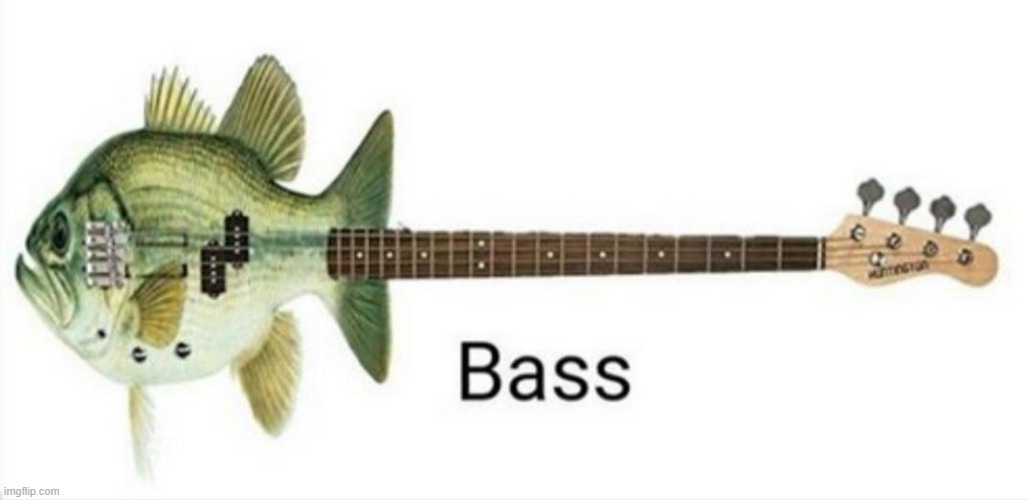In a world where music drives emotions and connects people, "it's all that bass" resonates as a powerful mantra for many artists and fans alike. The deep, rich sounds of bass not only fill concert halls and clubs but also inspire creativity and evoke nostalgia. From the throbbing vibrations of a bass guitar to the pulsating beats of electronic dance music, bass is the heartbeat of modern musical landscapes.
The phrase "it's all that bass" captures the essence of how fundamental bass lines are to various genres, whether it's hip-hop, pop, rock, or electronic music. Bass isn't just an accompaniment; it’s a crucial element that can transform a simple melody into an electrifying experience. Listeners often find themselves swaying, dancing, or even reflecting deeply on their lives as the bass reverberates through their bodies.
In this article, we will explore the significance of bass in music, its impact on various artists, and why it has become an integral part of our cultural fabric. Moreover, we will delve into the life of a prominent figure in the music industry who embodies this passion for bass, uncovering personal stories, achievements, and the influence they've had on the genre.
Who is the Bass Virtuoso Behind "It's All That Bass"?
The phrase "it's all that bass" can be attributed to various artists, but one standout figure in the music industry is the talented musician and producer, Marcus Miller. Known for his incredible skills on the bass guitar, Miller has made significant contributions to jazz, funk, and R&B music. His unique style and ability to fuse genres have earned him accolades and a dedicated fan base.
Marcus Miller: A Brief Biography
| Attribute | Details |
|---|---|
| Full Name | Marcus Miller |
| Date of Birth | June 14, 1959 |
| Nationality | American |
| Genres | Jazz, Funk, R&B |
| Instruments | Bass Guitar, Keyboards, Saxophone |
| Years Active | 1970s - Present |
What Makes Marcus Miller a Unique Artist?
Marcus Miller's artistry goes beyond technical skill. He has the remarkable ability to blend various musical elements, creating a sound that is distinctly his own. His work with legendary artists such as Miles Davis and Luther Vandross showcases his versatility and innovation. By incorporating jazz improvisation with funk grooves, Miller has set a new standard for bass players worldwide.
How Has "It's All That Bass" Influenced Modern Music?
The phrase "it's all that bass" has become a rallying cry for musicians and fans who appreciate the depth and texture that bass brings to music. In genres like hip-hop, the bass line often serves as the foundation for the entire track, while in electronic music, it drives the rhythm and energy of dance floors. This influence can be seen in the work of contemporary artists who prioritize bass in their compositions.
What Role Does Bass Play in Different Music Genres?
- Hip-Hop: Bass lines provide the backbone for beats, enhancing the lyrical flow.
- Rock: The bass guitar adds depth to the overall sound, complementing guitars and drums.
- Jazz: Bass serves as both a rhythmic and melodic instrument, allowing for improvisation.
- Electronic Dance Music: Bass kicks drive the tempo, creating an immersive experience for listeners.
Why Is Bass Essential for Live Performances?
During live performances, bass can dramatically change the atmosphere of a venue. It has the power to create an emotional connection between the artist and the audience. When the bass reverberates through the crowd, it energizes and unites people in a shared experience. Artists like Marcus Miller excel in live settings, where their bass skills captivate and inspire fans.
How Can You Get Involved with "It's All That Bass"?
For those inspired by the power of bass, there are numerous ways to get involved. Whether you're a budding musician or a passionate listener, embracing bass can enhance your musical journey. Here are some suggestions:
- Learn an Instrument: Consider picking up the bass guitar or any other instrument that resonates with you.
- Attend Concerts: Experience live music to feel the impact of bass in real-time.
- Create Your Own Music: Use digital audio workstations to experiment with bass lines and produce your own tracks.
- Join a Community: Connect with fellow music lovers and musicians through online forums or local clubs.
What Are the Future Trends for Bass in Music?
As music continues to evolve, the role of bass is likely to expand even further. With advancements in technology and production techniques, we can expect new sounds and styles that emphasize bass. Genres like trap and future bass are already showcasing innovative approaches to bass lines, and artists will continue to push boundaries in their quest for fresh sounds.
How Can You Appreciate "It's All That Bass" in Everyday Life?
Recognizing the significance of bass can enrich your listening experience. Whether you're enjoying your favorite tracks or discovering new artists, pay attention to how the bass influences the overall sound. From the subtle thump of a kick drum to the melodic lines of a bass guitar, appreciating these elements can deepen your connection to music and inspire your own creative endeavors.
In conclusion, "it's all that bass" encapsulates the essence of music that resonates deeply within us. Through the artistry of musicians like Marcus Miller, we see how bass can transform genres, elevate performances, and connect people. Embracing the power of bass in our lives can lead to a more profound appreciation for the art of music and inspire us to explore our own creative paths.
Tumbl Trak: Elevate Your Gymnastics Skills With The Right Equipment
Discovering The GDL Library: A Treasure Trove Of Knowledge
Exploring The World Of Matthews Tire: A Comprehensive Guide


